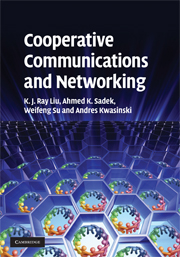Book contents
- Frontmatter
- Contents
- Preface
- Part I Background and MIMO systems
- Part II Cooperative communications
- Part III Cooperative networking
- 11 Cognitive multiple access via cooperation
- 12 Content-aware cooperative multiple access
- 13 Distributed cooperative routing
- 14 Source–channel coding with cooperation
- 15 Asymptotic performance of distortion exponents
- 16 Coverage expansion with cooperation
- 17 Broadband cooperative communications
- 18 Network lifetime maximization via cooperation
- References
- Index
11 - Cognitive multiple access via cooperation
from Part III - Cooperative networking
Published online by Cambridge University Press: 06 July 2010
- Frontmatter
- Contents
- Preface
- Part I Background and MIMO systems
- Part II Cooperative communications
- Part III Cooperative networking
- 11 Cognitive multiple access via cooperation
- 12 Content-aware cooperative multiple access
- 13 Distributed cooperative routing
- 14 Source–channel coding with cooperation
- 15 Asymptotic performance of distortion exponents
- 16 Coverage expansion with cooperation
- 17 Broadband cooperative communications
- 18 Network lifetime maximization via cooperation
- References
- Index
Summary
Despite the promised gains of cooperative communication demonstrated in many previous works, the impact of cooperation at higher network levels is not yet completely understood. In the previous chapters, it was assumed that the user always has a packet to transmit, which is not generally true in a wireless network. For example, in a network, most of the sources are bursty in nature, which leads to periods of silence in which the users may have no data to transmit. Such a phenomenon may affect important system parameters that are relevant to higher network layers, for example, buffer stability and packet delivery delay. We focus on the multiple access layer in this chapter. One can ask many important questions now. Can we design cooperation protocols that take these higher layer network features into account? Can the gains promised by cooperation at the physical layer be applied to the multiple access layer? More specifically, what is the impact of cooperation on important multiple access performance metrics such as stable throughput region and packet delivery delay?
In this chapter, we try to address all of these important questions to demonstrate the possible gains of cooperation at the multiple access layer. A slotted time division multiple access (TDMA) framework in which each time slot is assigned only to one terminal, i.e., orthogonal multiple access is considered. If a user does not have a packet to transmit in his time slot, then this time slot is not utilized.
Information
- Type
- Chapter
- Information
- Cooperative Communications and Networking , pp. 395 - 431Publisher: Cambridge University PressPrint publication year: 2008
